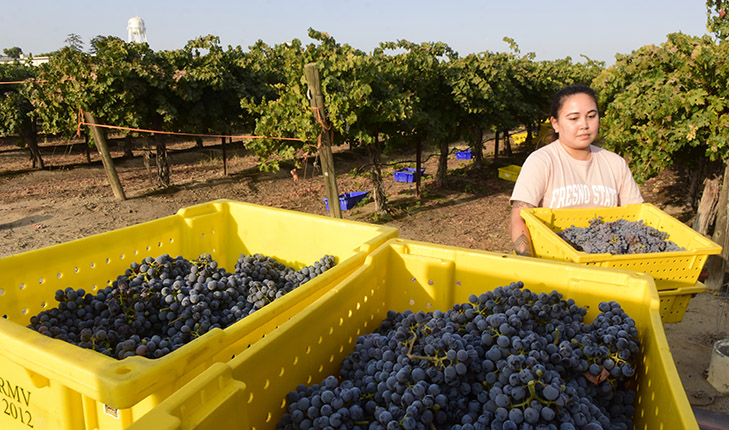Fresno State’s Jordan College of Agricultural Sciences and Technology will receive $18.75 million in one-time funding from the state in its 2022-23 budget to provide infrastructure needed to build programs that prepare future generations for regenerative agriculture practices. This will build long-term stability for food and agricultural systems in the face of changing climate patterns.
“The food and agriculture sectors are crucial to the future stability of our region, state and nation. Educating students and building resilience in these sectors is critical to the success of farmers and others in these sectors,” said Dennis Nef, dean of the college. “This investment by Gov. Gavin Newsom and the state legislature in climate-smart agriculture will benefit future generations by providing students entering the workforce with skills that will enable them to tackle the environmental challenges that face us and ensure the health of land, water and air resources into the future.”
California’s 2022-23 budget, signed by Newsom on June 30, included $75 million earmarked for California State University farms to make equipment and infrastructure improvements to the university’s agricultural production units. Each campus will receive $18.75 million.
The funding was made possible through the collaborative efforts of the four Cal State Universities that have agriculture campuses: Fresno State, California Polytechnic State University, San Luis Obispo, California State Polytechnic University, Pomona, and California State University, Chico.
At Fresno State, more than 1,900 students are actively engaged in academic programs with direct ties to agriculture — and work directly on the 1,000-acre University Agricultural Laboratory on campus managing the onsite operations of 18 different enterprises and gaining first-hand experience that prepares them for successful careers.
In 2020 California’s farms and ranches generated sales of $49.1 billion. More than a third of the country’s vegetables and two-thirds of the country’s fruits and nuts are grown in California. Fresno State sits in the heart of the San Joaquin Valley and the four counties it serves account for more than 39% of California’s farm output — making it essential that the future workforce being trained at the university is prepared to address climate-smart agricultural solutions.
At Fresno State, funding will be used for the following:
- Replace aging farm equipment with climate-smart upgrades.
- Automate irrigation systems.
- Invest in energy-efficient systems at the winery, the dairy and the meat science lab.
- Enhance the Plant Sciences program with greenhouse facility upgrades.
- Reduce the environmental footprint of the animal units.
The Jordan College employs more than 100 students at its 18 University Agricultural Laboratory enterprises, where students learn first-hand the intricate details of managing and operating these units. In addition, these facilities serve as classrooms — exposing students daily to existing challenges and preparing them to be future leaders. The campus winery is the first bonded winery on a college campus in the country.
“We maintain a laser focus on student success by using high-impact practices including jobs on the University Agricultural Laboratory, internships and case studies in the classrooms,” Nef said. “This funding will help us make improvements that will leverage the support we receive from our industry partners who know that investing in the future workforce helps guarantee a bright future for our students.”





